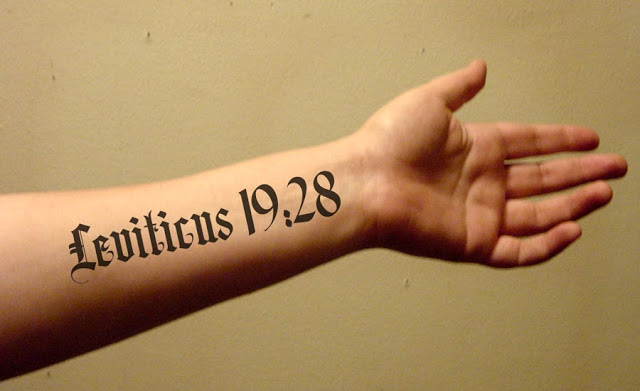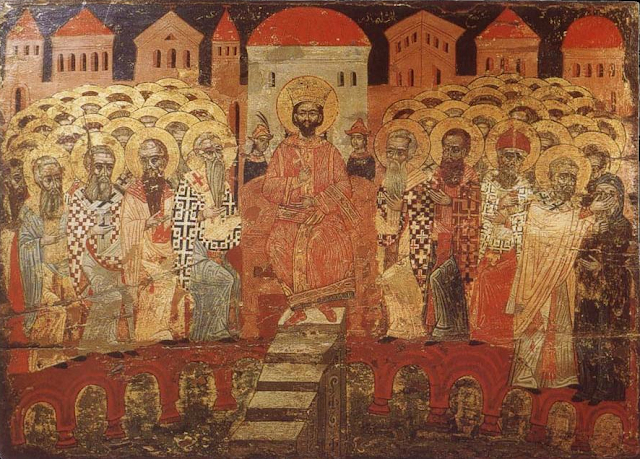There is no canon, at least to my knowledge that teaches Christians should not get a tattoo. However, we do find the following in the Law of Moses:
“Ye shall not make any cuttings in your flesh for the dead, nor print any marks upon you: I am the Lord” (Leviticus 19:28).
Unfortunately, I do not have any patristic commentaries that address this verse, though they may be some out there. But if all we had was this verse, it could be argued that this is just a ceremonial law that no longer applies to Christians. However there are several reasons why that would be an incorrect conclusion:
1. With the exception of the Copts, Ethiopians, and Bosnian Croats, the Christian Tradition has universally rejected tattoos. And there are historical reasons why these Christian groups are an exception – they tattoo their children with crosses so that if they are kidnapped by Moslems, they can later be identified as Christians; and given the intense level of persecution they have faced, this has also been a way of proclaiming their intention of remaining a Christian, no matter what may come (a tattoo being, by its nature, a very permanent statement). However, it is both interesting and instructive that Orthodox Christians living in the same circumstances never adopted a similar custom.
2. Most of the tattoos that people have in our culture are not modest and pious crosses designed to protect children from kidnapping or to testify to one’s commitment to standing firm for Christ, but are all kinds of things that are usually frivolous at best, and often unwholesome. If you read what the Scriptures have to say about modesty, it is unlikely that the inspired writers would have spent so much time encouraging us to dress in ways that are not immodest, or draw unnecessary attention to ourselves, and yet would be O.K. with a tattoo just above the crack of your behind (just to cite one popular trend as an example).
3. St. Paul says that our bodies are the Temple of the Holy Spirit: “What? know ye not that your body is the temple of the Holy Spirit which is in you, which ye have of God, and ye are not your own? For ye are bought with a price: therefore glorify God in your body, and in your spirit, which are God’s” (1 Corinthians 6:19-20). Imagine if someone took a spray paint can, and expressed themselves over the walls of a Church. We would all be shocked that someone would do such a thing, but it is no different to express yourself by defacing your body – because you are bought with a price, and are not free to so whatever you want with your body… if indeed you are a believer.
Of course if someone already has a tattoo, it is certainly not an unpardonable sin. And when we see someone with a tattoo, we should not judge them, because they may have repented of getting that tattoo a long time ago. But those contemplating getting a tattoo should ask themselves why they want one in the first place, and they should ask whether this is really something that pleases God. Once you get a tattoo, they are not easy to get rid of, and what you think looks cool today, may not seem so cool to you in ten or twenty years.
Here are two replies to some comments this post has received on Facebook.
In response to a comment that saw a contradiction between acknowledging that there are no canons against tattoos, but my statement that the Christian Tradition has universally rejected tattoos.
The actual practice of the Church is a testimony to the Tradition of the Church. It is not as if tattoos were a recently discovered technology, They had tattoos when Moses wrote the Law. But aside from the unique cases of the Copts and Ethiopians, Christians have universally rejected tattoos. It is only in my lifetime that having a tattoo has gone from something those on the fringes did (sailors, soldiers, and marines – away from home; gang members, and convicts) to something that young ladies from decent homes are doing.
In response to a catechumen who has religious tattoos, and similarly questioned whether the Church really has rejected tattoos.
Not all of the Tradition of the Church has been written out in the form of canons. We generally only have canons to guard against people doing something when there are some people in the Church who are doing it. Tattoos were something that no Christians (outside of the exception I discussed) did. Until only very recently, no Christian group of any kind would have suggested that such a practice was befitting a Christian. Now, in your case, your tattoos were probably very well intentioned, but people often do things in ignorance that they should not do. As St. Paul put it in 1 Corinthians 11:16: “But if any man seem to be contentious, we have no such custom, nor do the churches of God.”
And on the authority of unwritten Traditions, consider St. Basil’s words, which were specifically endorsed by the 4th, 6th, and 7th Ecumenical Councils.
In response to some who have disputed whether Christians really have historically rejected tattoos.
It is not merely coincidence that the pagan Romans, Slavs, and Germans practiced various forms of tattooing, but when Christianity was established in those areas, these practices ceased. Even the word “tattoo” demonstrates that this was not part of the Christian culture, because it is a Polynesian word, that was not in use in English prior to the 18th century, and there is no record of any tattoo artists in either England or the United States prior to the 19th century.







You speak very truthfully about this matter. On one hand, we still have legalists who want to quote Leviticus which, if we investigate it, was written as a result of the tattooing of the pagans. This is much the same as the braided hair and use of make-up for the intentions by the pagans of the day.
By the same token, when we look at other things Paul writes about our walk with Christ, we are also told not to do things which may be a stumbling block to others, (I Corinthians 8:9), and about doing all things to the glory of God; (I Corinthians 10:31). If we cannot say that getting a tattoo brings glory to God, or question whether or not it may cause another to stumble, it may be best not to get it, even if no church canon or verse of Scripture expressly prohibits it.
I recall in my younger days approaching a Bishop visiting us from Syria where my brother and I were considering turning our bodies into the Sistine Chapel with pictures of Christ, Theotokos and Saints and all, so we asked him whether it was ok to do it, to which he replied, "My spiritual children, you certainly can do it and have my whole hearted approval". So we were quite pleased with that response, though my mother wasnt, and smuggly looking at each other His Eminence then said "but under 1 condition". "Certainly!" we both replied with glee, tho which His Eminence continued, "You have to first tattoo your heart with the cross of Christ and then I fully support the tattooing of your body". At that point my mother triumphantly smiled and walked off whilst me and my brother understood His Eminence good and proper and put off any idea of tattooing our bodies!
Very simply a tattoo is a puncture wound made in the skin that is filled with ink. Although done differently today than in the past the technique is still somewhat similar. face tattoos
Asian Tattoos
I suggest you look at different types of tattoos, trash polka tattoo
This is insane! I never know about all this. Currently, I am thinking to get a custom tattoo from a well-known tattoo studio. But now I will keep all these factors in mind.
While, I respectfully giveway to Fr Whiteford on matters of canonic law on these matters, I think there are a couple of points that are worth pointing out.
Fr writes – ” that was not in use in English prior to the 18th century”, prior to the adoption of the word tatoo from, tattoos were simply referred to as ‘marking’ or ‘pricking’
similarly – “there is no record of any tattoo artists in either England or the United States prior to the 19th century.”, When Caesar invaded the British Isles in 55BC, the british were already tattooed then. When the normans arrived a thousand years later, they adopted tattoos from the natives british.
Let us not also forget the crusader tattoos of the 7th century. Some returned to england (and i’m sure other places) bearing tattoos from the Holy Lands.
I offer, this not as a criticism, but a ‘corrective and possibly interesting’ footnote.
En NSJC
First website I find that clears my concerns in this topic. Wikipedia mentions the Croats, the Copts and some crusaders, but my main doubt was with the Orthodox Tewahedo Church (which I didn’t know uses tattoos) and the eastern Orthodox. Thanks.
Hi.. you said the phase by St Paul that our body is the temple of the Holy Spirit, church is also a building that represent a physique temple of the Holy Spirit, so both are temples our body and the church, why do we paint churches wih mural icons? Cause we want to make them more beautiful. Why doesnt anybody speak for St John Chrysostom when he “attack” the woman who wear make up. How many girls and woman wear make up nowdays and nobody tells a singel word to them? Church only advice you to not make tattoos cause its bad for your health but church cant stop you or force you to do things.
The Copts use a small tattoo of the Cross on the wrist to identify themselves as Christians. When I have been in Egypt young boys have shown me their Cross tattoos as a matter of pride in the Lord Jesus Christ ✝️
It takes courage to be tattooed in the way in parts of Egypt!
☦️ Br.Iain OblSB Antiochian Orthodox.
What does tha tattoo say
Save what ?